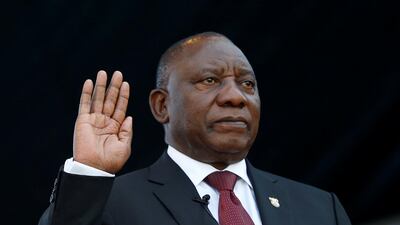South Africa's President Cyril Ramaphosa promised a “new era” after taking the oath of office on Saturday, saying the country was at a defining moment in its history.
Mr Ramaphosa's African National Congress party, which has governed South Africa since the end of white minority rule in 1994, won a general election earlier this month with the smallest margin in its history, reflecting growing anger over the stagnant economy, high unemployment, inequality, crime and corruption.
“A new era has dawned in our country. A brighter day is rising upon South Africa,” Mr Ramaphosa, 66, said at his swearing-in ceremony in the capital, Pretoria. More than 40 heads of state were among the 36,000 people who witnessed the event, replete with pomp, military honours and an air force flyover.
“This is a defining moment for a young nation like ours. It is a time for us to make the future that we yearn for,” he said.
Mr Ramaphosa, 66, became president last year after assuming leadership of the ANC following an internal revolt against the scandal-plagued former president Jacob Zuma.
The former trade unionist played a prominent part in the struggle to end white-minority rule. At one point he was seen as a protege of Nelson Mandela, before becoming a successful businessman and serving as vice president to Mr Zuma.
Mr Ramaphosa vowed to root out corruption after Mr Zuma was forced to resign after nine years in office, and on Saturday he pledged to “build the South Africa that we all want and deserve".
“Let us forge a compact for an efficient, capable and ethical state, a state that is free from corruption,” he said.
Mr Ramaphosa faces a herculean task to tackle the country’s many problems – from a sickly economy in which more than a quarter of the workforce is jobless to land ownership that remains overwhelmingly in the hands of white South Africans.
Many solutions will require him to balance left-wing calls for radical change with investors’ demands for caution.
The corruption scandals and economic struggles have also dented support for the ANC.
Mmusi Maimane, leader of the opposition party Democratic Alliance, said he wanted to work with Mr Ramaphosa to improve the lives of South Africans.
“Today is a historic day in South Africa, the people of this country have spoken, now the job that we have to make sure we do is build the reforms,” he said.
“I will work with the president when he supports the people of this country but when he puts the ANC first I will not be there.”
Mr Ramaphosa’s first test will be choosing a cabinet – a challenging task given the factional rivalry within the ANC.
The president is expected to name his new team within days, but the choice of vice president hangs in the balance after the most likely candidate, David Mabuza, said he would delay taking his seat in parliament until he cleared himself of corruption allegations.

